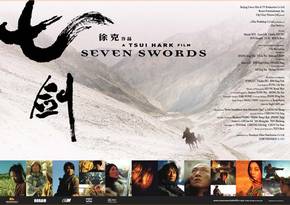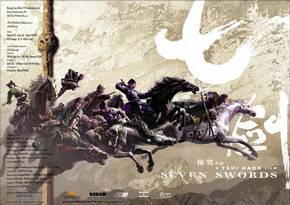 |
Statistics :
11630 Movies
19215 People
1448 Studios
29 Articles
73 Interviews
12 DVD Reviews
32452 Screenshots
3722 Videos
|
|
 |
 |
The Weapons of Choice |
1/1 - Page 1 |
 |
 |
 |
 |
 |
|

|
There is something magical about Seven Swords (Qi Jian), and it's not just the USD 7 million (RMB 56 million) it grossed in its first two weeks on Chinese screens – despite the foot wrinkling typhoon which should have kept people at home watching reruns of The Wild Bunch. Seven Swords is a film born out of wuxia (“Chinese chivalry”) tradition, “Wuxia literature is an art and culture of its own” says Seven Swords Hong-Kong-based film director Tsui Hark. “These are imaginary stories developed from our everyday lives, expressing the spirit of justice, heroism and humanity.” Wuxia novels grow out of a deep cultural heritage and are mostly tales of Chinese knights in Ancient China, moving in a world of martial arts, or Jiang Hu.
|
 |
 |
 |
| |
| the weapons of choice |
Wuxia pian is the film genre derived from this magical literature (kungfu movies fall into this category) and, in these action packed stories, characters practice kungfu and possess all manner of magical skills - think flying around in tree tops and some acrobatics that would make Schwarzenegger and Stallone take cover. Endless characters and intricate, interconnected subplots keep you going while everyone has their feet on the ground. The so-called ‘Hong-Kong Spielberg's' latest production attempts to seduce Chinese audiences by conjuring the ultimate “wuxia” spirit onto the silver screen.
Vietnam-born filmmaker Tsui Hark, in the trade for more than 25 years, has delivered some of the best wuxia movies ever made in the Chinese mainland and Hong-Kong. Trained in Hollywood filmmaking methods, he's always on the lookout for new ideas and experimenting in order to explore and expose China's cultural heritage to new generations of filmgoers.
|
|
Tsui Hark began his film career in the late 70s directing the acclaimed wuxia TV-series The Gold Dagger Romance. Although he had started making 8mm-experimental films at age 13, this was his first real work. In 1981, he was internationally acclaimed for the gravity-defying martial-art tale Zu Warriors from the Magic Mountain. Despite being the first Hong-Kong movie to integrate Hollywood special-effect techniques (blue screen), it was a domestic flop.
Since then, with more than 60 movies produced and 40 directed, Tsui has tried to find the right balance between personal experimentation, ambition and commercial success with his own company, the Film Workshop. He co-founded the Film Workshop in 1984 with his wife Nansun Shi, one of Hong-Kong's top producers. In this laboratory for cinematic experiments, they have been busy reviving all sorts of film genres. “We think that the Chinese heritage has a lot to offer,” says Nansun. “We're still trying to find the stories which would be successful in both domestic and international markets. “ |
|
Tsui has paid tribute to Chinese folklore and arts; not only revitalizing period dramas and wu xia pian in the 80s and 90s, but also breaking new ground. The trilogies, A Chinese Ghost Story and Swordsman, and The Lovers are among his most outstanding works. That said, as original, iconoclastic and experimental as the 55-year-old director may be, he's managed a series of commercial successes.
It's no overstatement to say that Tsui Hark fueled the local film industry from 1986 to 1996 with new ideas, trends and filmic formulas. Pragmatic Hong-Kong producers copied his stories and style at will. They over-flooded the market with about 200 films a year and made easy money – on a positive note, they permitted new filmmakers and actors to emerge and made the style into a genre. All these movies were made for the Hong-Kong market; with Taiwan and Korea as junior financial territories. Nowadays, it has become unrealistic for a big-budget film to recoup costs just from the Hong-Kong market. |
|
Tsui Hark learnt this fact of life the hard way. In the mid-nineties, the Asian film industry went downhill, because of the Asian financial crisis, the rise of piracy, Hollywood and Chinese mainland competition, and the exodus of film-talent to the West. Industry vitality declined for nearly a decade. The Film-Workshop's productivity also dropped, with an average of only one movie a year since 1998, compared to five movies a year between 1986 and 1994.
After a brief period in the USA around 1997 (where he found Hollywood-studio policies far too restrictive), and several attempts in Hong-Kong with foreign investments, Tsui finally produced a couple of low-key, and unsuccessful, movies in the Chinese mainland. Perhaps they were an attempt to assess the local market and Chinese film-production methods, but the experience certainly paved the way for his next ambitious step. “You should not define yourself just in a certain place, it'd be good to go to different places to make movies,” said Tsui at a press conference in Shanghai in July. “It's my dream to do so and as the majority of the audience is in the Chinese mainland I should do my best for them.” |
|
And so he has. The wuxia pian Seven Swords, was just the right opportunity for him to come back under the spot lights and to expand his trade and fame into the Chinese mainland market. With a simple plotline -- seven warriors come together to protect a village from a diabolical General - but much attention drawn to characterization and production design, the movie made material Tsui's ambition. Three teams, three action choreographers and three directors of photography shot 11 principal characters day and night, for three months, to complete the USD18 million China/Hong-Kong/Korea/Singapore co-production.
An important Chinese TV-production company originally approached Tsui for creative inputs for a local TV series based on Liang Yu-sheng's classic novel, Seven Swordsmen from Mountain Tian. With genuine knowledge of the source material and a deep understanding of the creative potential the story could offer, Tsui managed to stretch the project into a series of feature films and TV series, to be shot with Hong Kong crews and a Chinese cast. Indeed, Tsui and his wife and partner, Nansun believe bilateral cooperation is the best way to keep the Hong-Kong cinema alive. A Seven Swords producer and industry maven for three decades, Nansun says: “we are the people who can make it up to the Hong-Kong film industry, if we don't try, who will?” Extremely motivated and excited by the project, Tsui dropped the production of Initial D, for which he had already started pre-production work in Japan. This film was eventually made by Andrew Lau and Alan Mak, who delivered a flat vehicle for pop-idol Jay Chou. |
|
Seven Swords is also Tsui's attempt to reconcile Chinese audiences with the ‘pugilistic world or martial arts'. Since Ang Lee's Crouching Tiger, Hidden Dragon hit global screens in 2000, numerous ‘high-aesthetic' wuxia pian have been made to capture the taste of global audiences. The somewhat more ‘understated' Chinese audience felt the true wuxia spirit was lost along the way to please foreigners. Says Tsui: “Nowadays kungfu movies are becoming more and more abstract, so abstract that I felt it was time to take the genre back to the real thing.”
With Seven Swords, Tsui Hark has found a license to experiment - and make money. Ironically, he's doing it the Hollywood way, a la the Matrix trilogy with its movie-related products, Seven Swords will become a series of feature films, a TV series, video games and comic books. Can Seven Swords dolls be far behind? Although a multitude of characters and several subplots are common in wuxia , the complexity of the story may have as much to do with the bank as the story. Which may help explain why many critics and audience members came out of the film confused. Explains Tsui “the clues left in this first movie are necessary and directly linked to the following stories.”
To clear up the confusion, Tsui, like George Lucas with Star Wars, wrote the “Seven Swords bible,” detailing the characters' development and their world. “Society is composed of many human beings, so is Jiang Hu, ” he says. “I just want to make Seven Swords close to real life and provide emotion. ” Seven Swords isn't flawless; but it's a success for its creator in the sense that he's become more “bankable”. In the wake of that success, Tsui is piling up forthcoming projects. In the near future, a France-produced movie, The White Phoenix, and a kungfu/comedy starring Stephen Chow. It seems likely Tsui Hark will carry on his role of cinematic ambassador of Chinese culture for many years to come. May the force be with him. |
|
|
|
|
|
| |
 |
|
|
Page :
1
2
3
4
5
6
Top
|
|
|
|
|
|
|
 |
